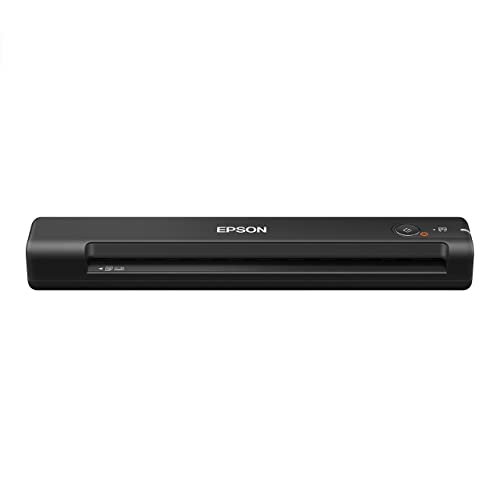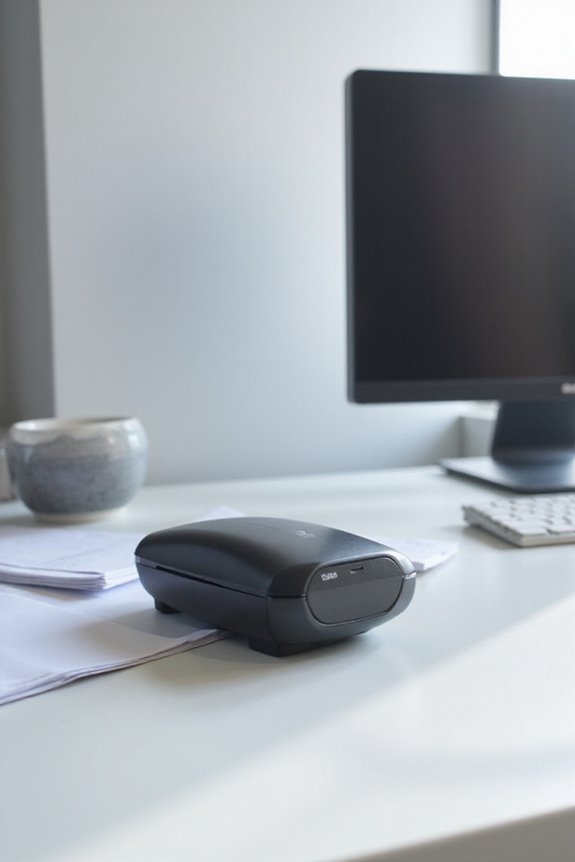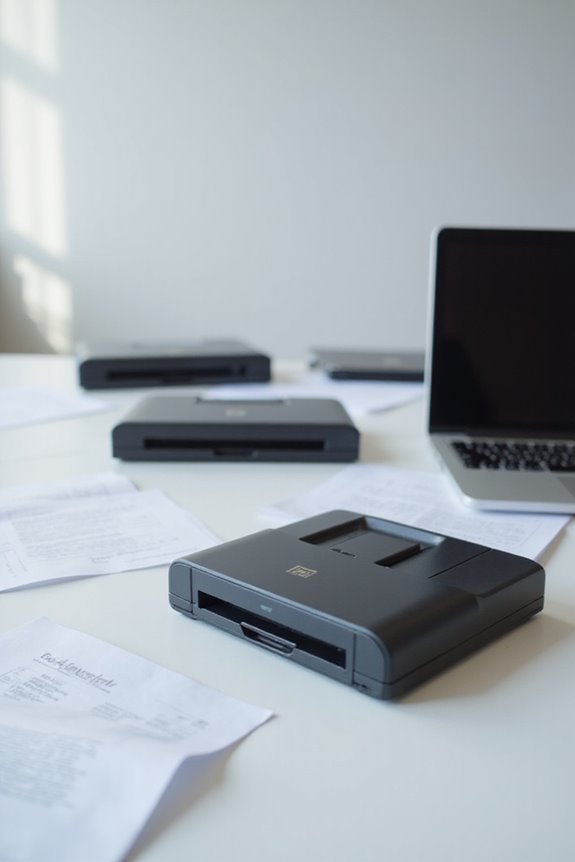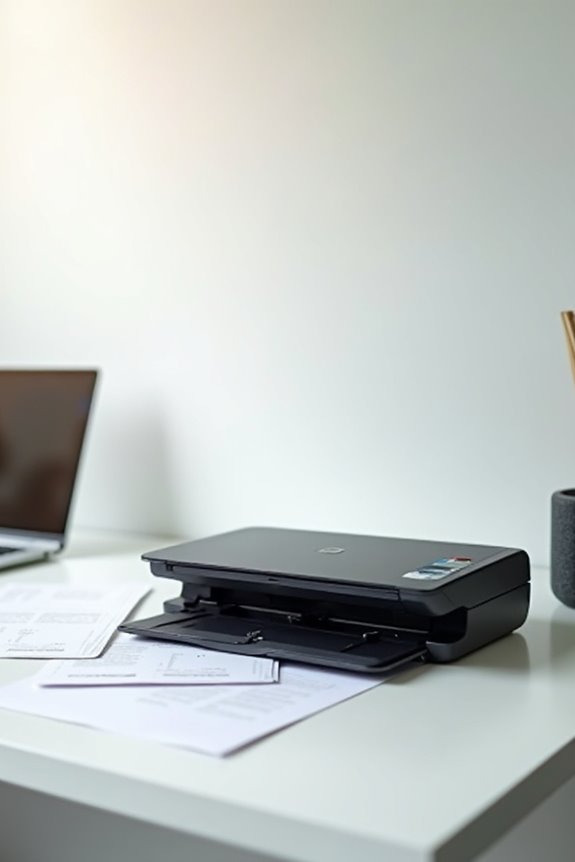As an Amazon Associate, we earn from qualifying purchases. Some links may be affiliate links at no extra cost to you. Although our opinions are based on curated research, we haven't used these products. Articles generated with AI.
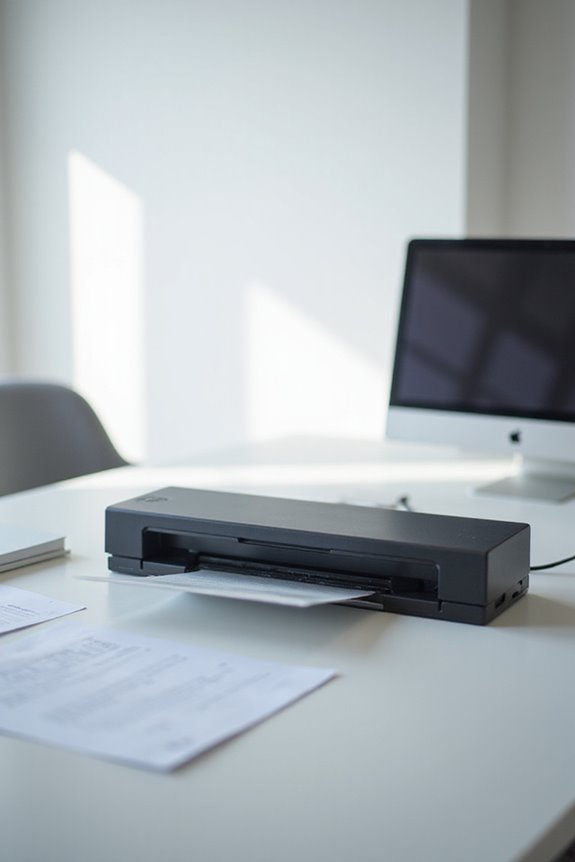
5 Best HIPAA-Compliant Medical Record Scanners for Streamlined Patient Care
When selecting the best HIPAA-compliant medical record scanners, consider options like the Eyoyo QR Code Scanner for its Bluetooth capability, and the Plustek Mobile Scanner S410 Plus, which offers portability. The Epson WorkForce ES-50 scans a page in just 5.5 seconds, enhancing efficiency. The IPEVO V4K-S features AI and OCR technology for accurate digitization, while the Symcode Hands-Free Scanner provides effortless scanning. These features guarantee compliance and streamlined patient care. Explore more options to find the perfect fit for your needs.
Key Takeaways
- Look for scanners that provide robust audit trails to ensure HIPAA compliance and track access changes effectively.
- Choose devices with fast scan speeds, ideally around 5.5 seconds per page, to enhance workflow efficiency in busy medical environments.
- Opt for models that support various document sizes and batch scanning, accommodating multi-page records for streamlined processing.
- Ensure that scanners deliver high image quality with a minimum resolution of 300 DPI for accurate document readability and OCR performance.
- Evaluate total cost, including initial price, maintenance expenses, and warranty options, to invest wisely in durable medical technology.
Eyoyo QR Code Scanner Bluetooth Barcode Reader
Eyoyo Upgraded QR Code Scanner Bluetooth Android Barcode Scanner, Portable Back Clip Wireless 1D 2D...
- Phone Back Clip Design: The Eyoyo phone scanner, weighing only 90g (3.1oz) and featuring a retractable bracket, can be easily mounted on your iPhone or Android phone....
- Bluetooth Barcode Scanner: The Eyoyo back clip barcode scanner is specially designed to work with your smartphone. With a Bluetooth connection, You can scan the barcode...
- 1D 2D QR Barcode Scanner: Eyoyo barcode scanner With advanced CMOS sensor ability which can easily capture most of the 1D barcodes, such as UPC/EAN, Code39, Interleaved 2...
If you’re in the healthcare sector and need a reliable scanning solution, the Eyoyo QR Code Scanner Bluetooth Barcode Reader stands out for its portability and versatile functionality. Weighing just 90 grams, it fits comfortably in your hand. This scanner seamlessly connects to both iPhone and Android devices via Bluetooth, allowing you to access scanned barcodes directly on your phone. With an advanced CMOS sensor, it reads various 1D and 2D barcode formats, enhancing your inventory management processes. You can use it as a back clip on your smartphone or as a standalone device, catering to your specific needs effectively.
Best For: The Eyoyo QR Code Scanner Bluetooth Barcode Reader is best for healthcare professionals and businesses in need of a portable and versatile barcode scanning solution.
Pros:
- Lightweight design (90 grams) enhances portability and comfort for prolonged use.
- Compatible with both iPhone and Android devices, facilitating seamless integration with existing mobile systems.
- Versatile usage options as both a back clip for smartphones or a standalone Bluetooth scanner.
Cons:
- Limited scanning range may not meet the needs of large warehouse environments.
- Reliance on Bluetooth connectivity may pose issues in environments with signal interference.
- The need for charging or battery replacement could be inconvenient for some users.
Plustek Mobile Scanner S410 Plus – Portable Sheet-Fed Document Scanner
Plustek Mobile Scanner S410 Plus - Portable Sheet-Fed Document Scanner - for Windows 7 / 8 / 10 /...
- Digitize on the Go - Connect to your computer via BUS powered, eliminating the need for batteries or external power sources
- Button Free Scanning Experience - The S410 Plus is an automatic scanning device, no need to push any buttons or click any screens, and automatically processes images and...
- Versatile Paper Handling - Easily scan documents ranging from Letter and Legal sizes to business cards, plastic ID cards, invoices and receipts
The Plustek Mobile Scanner S410 Plus is an excellent choice for healthcare professionals seeking a portable, HIPAA-compliant solution for digitizing medical records. Weighing in at just 14.4 ounces and measuring 1.6 x 11.7 x 1.9 inches, it’s extremely lightweight and compact, perfect for on-the-go use. This scanner connects via BUS power, eliminating the need for batteries. With automatic scanning, it processes and saves documents efficiently to designated folders. Its built-in OCR feature converts scanned images into editable formats like searchable PDFs or Word documents. Priced under $100, it’s a budget-friendly option that doesn’t compromise on performance.
Best For: Healthcare professionals seeking a portable, HIPAA-compliant solution for digitizing medical records.
Pros:
- Lightweight and compact design for easy portability.
- Automatic scanning and built-in OCR for efficient document processing.
- Affordable price point under $100, offering good value for performance.
Cons:
- Some users report scanning quality issues, such as dust affecting scans.
- Compatibility issues noted with Windows 11 recognition and calibration software.
- Limited customer support could delay resolutions for technical issues.
Epson WorkForce ES-50 Portable Sheet-Fed Document Scanner for PC and Mac
Epson WorkForce ES-50 Portable Sheet-Fed Document Scanner for PC and Mac
- Fastest and lightest mobile single sheet fed document scanner in its class(1) small, portable scanner ideal for easy, on the go scanning
- Fast scans a single page in as fast as 5.5 seconds(2) Windows and Mac compatible, the scanner also includes a TWAIN driver.
- Versatile paper handling scans documents upto 8.5 x 72 inches, as well as ID cards and receipts
Epson’s WorkForce ES-50 Portable Sheet-Fed Document Scanner is an ideal choice for healthcare professionals needing a reliable, HIPAA-compliant solution for managing medical records. Weighing just 9.4 ounces and measuring 1.8 x 10.7 x 1.3 inches, it’s incredibly portable. You’ll enjoy fast scanning speeds of up to 5.5 seconds per sheet. The included Epson ScanSmart Software makes it easy to create searchable PDFs and editable documents. Plus, you can scan directly to cloud storage. While there’s no double-sided scanning and some users report driver issues, its overall performance has garnered a solid 4.3-star rating from thousands of users.
Best For: Healthcare professionals needing a reliable, portable scanner for managing medical records efficiently.
Pros:
- Fast scanning speed of up to 5.5 seconds per sheet enhances productivity.
- Compact and lightweight design (1.8 x 10.7 x 1.3 inches and 9.4 ounces) makes it easy to transport.
- Versatile scanning capabilities allow for creating searchable PDFs and editable documents via included software.
Cons:
- No double-sided scanning feature limits efficiency for certain document types.
- Potential driver issues reported by users, especially with older macOS versions.
- Mixed experiences with customer support, particularly regarding troubleshooting driver problems.
IPEVO V4K-S Document Scanner with AI and OCR
IPEVO V4K-S Document Scanner with AI and OCR for Scanning and Digitization of Books, Business Cards,...
- 8 MEGAPIXEL CAMERA - With an image sensor by Sony, a freely adjustable stand, a professional scanning pad, and scanning software (perpetual license) with dedicated...
- ULTRA-FAST SCANNING - AI preprocessing features and continuous scanning functions make your work easy and free your hands for page turning and document aligning.
- 200+ LANGUAGES OCR (optical character recognition), powered by ABBYY - Text, font, document layout, embedded pictures, and tables are automatically detected and...
For healthcare professionals seeking an efficient way to digitize patient records, the IPEVO V4K-S Document Scanner stands out with its 8 Megapixel camera and AI-powered features. This scanner effortlessly captures tabloid-sized materials (11 x 17 inches), making it versatile for various documents like IDs and teaching materials. The ultra-fast scanning guarantees prompt digitization, while its multilingual OCR supports over 200 languages, enhancing accessibility. You’ll appreciate the adjustable stand and professional scanning pad for best results. However, some users report challenges with software setup and image distortion, so evaluate its compatibility with your workflow before making a decision.
Best For: Healthcare professionals and educators looking for an efficient and versatile solution to digitize patient records and teaching materials.
Pros:
- Ultra-fast scanning capabilities streamline the digitization process, saving valuable time for busy professionals.
- The multilingual OCR feature supports over 200 languages, making it suitable for diverse user needs.
- The adjustable stand and professional scanning pad ensure optimal results for various document types.
Cons:
- Some users have reported technical issues with software setup and performance, which may hinder usability.
- The page-flattening feature has been deemed ineffective by certain users, affecting the quality of scanned documents.
- Image distortion caused by AI features can compromise the clarity and accuracy of scanned materials.
Symcode Hands-Free Barcode Scanner
Symcode 1D 2D Hands-Free Barcode Scanner, with Omnidirectional Automatic Sensing Scanning Barcode...
- 【Efficient Hands-Free Operation】 2D QR Hands-Free Barcode Scanner offers a convenient and efficient solution for hands-free scanning in a busy retail environment....
- 【Omnidirectional Scanning】Barcode Scanner omnidirectional scanning capability ensures that barcodes are captured from various angles , providing flexibility in how...
- 【Automatic Sensing Technology】 The automatic sensing technology is a notable advantage, as it initiates scanning when a barcode is presented , eliminating the need...
Designed with busy professionals in mind, the Symcode Hands-Free Barcode Scanner excels in environments where efficiency is essential, such as medical practices. This compact scanner measures 3.2 x 3.2 x 5.5 inches and weighs just 14.1 ounces, making it easy to integrate into your workspace. Its hands-free operation and omnidirectional scanning allow for quick and flexible scanning of barcodes, enhancing workflow. With automatic sensing technology, it wakes up instantly when a barcode is near. Plus, its plug-and-play USB connection guarantees seamless integration with existing POS systems. Despite some user feedback on setup, it provides excellent value for your patient care needs.
Best For: Busy retail and medical professionals seeking an efficient hands-free barcode scanning solution.
Pros:
- Hands-free operation enhances efficiency in fast-paced environments.
- Omnidirectional scanning allows for flexible scanning from various angles.
- Automatic sensing technology provides instant wake-up for quick scanning.
Cons:
- Some users reported confusing instructions for advanced features.
- Mixed reviews on customer support and product condition on arrival.
- Certain specific barcode designs may pose challenges for scanning.
Factors to Consider When Choosing Medical Record Scanner Hipaa
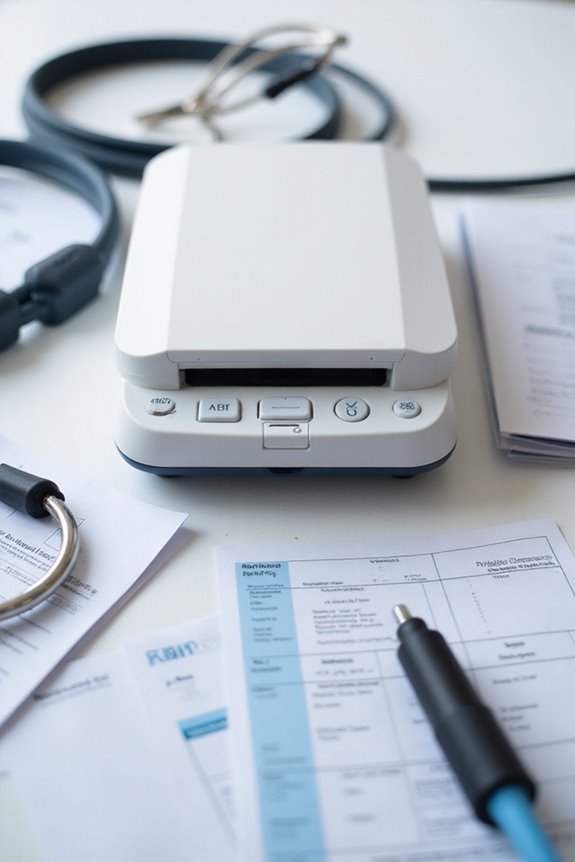
When you’re choosing a HIPAA-compliant medical record scanner, consider several key factors. Compliance with HIPAA regulations, scan speed, and document capacity are essential for efficiency in your practice. You’ll also want to assess image quality and portability to guarantee the scanner fits seamlessly into your workflow.
Compliance With HIPAA Regulations
Choosing a medical record scanner is critical, especially since compliance with HIPAA regulations guarantees the protection of electronic protected health information (ePHI). Look for scanners that incorporate robust encryption features to keep patient data secure during transmission and storage. Verify the device supports audit trails, enabling you to track any access or changes to scanned records, which is essential for HIPAA compliance. Also, consider scanners that offer secure user authentication mechanisms, like password protection or biometric access, to prevent unauthorized data access. Regular software updates and security patches are important in addressing vulnerabilities and maintaining HIPAA standards. By prioritizing these features, you can confidently select a medical record scanner that enhances patient data protection and overall care efficiency.
Scan Speed and Efficiency
Selecting the right medical record scanner means considering how quickly it can process documents. Scan speed plays a essential role in overall efficiency, with some scanners processing a page in just 5.5 seconds. This quick performance notably cuts down wait times in busy medical settings, allowing healthcare staff to access patient records more efficiently. High-speed scanners enhance workflow productivity, enabling the digitization of large volumes of documents in a shorter timeframe. They also excel at handling various document sizes while maintaining speed, imperative for diverse record formats. Most importantly, efficient scanning technology minimizes time spent on manual data entry by swiftly converting paper documents into editable digital formats, streamlining your operations and improving patient care delivery.
Document Size and Capacity
Document size and capacity are essential factors when evaluating HIPAA-compliant medical record scanners. First, check the maximum document size; larger forms or multi-page records require a scanner that can accommodate these dimensions. Assess the capacity for batch scanning, which lets you process multiple records efficiently, cutting down manual feeding time. Look for scanners that support various paper sizes—standard letter, legal, and specialty sizes—to guarantee versatility. Speed also matters; a scanner’s performance, measured in pages per minute (PPM), can greatly enhance workflow in busy medical settings. Finally, consider the scanner’s ability to handle different media types, like thick documents and plastic cards, making sure it accommodates all necessary medical record formats effectively.
Image Quality and Resolution
Image quality and resolution stand as foundational elements in the process of digitizing medical records. To guarantee accuracy for HIPAA compliance, you’ll want a scanner with at least 300 DPI, especially for documents that feature small text or detailed graphics. High resolution means better readability, helping you avoid losing essential information. Scanners with color imaging capabilities enhance clarity for records that include colored text or graphics, making a significant difference during retrieval. Additionally, maintaining consistent image quality across various document types—like ID cards and multi-page records—is vital. Remember, improved image quality can positively influence the performance of OCR software, streamlining the conversion of documents into editable formats for efficient electronic record-keeping.
Portability and Design Features
When it comes to choosing a medical record scanner that adheres to HIPAA guidelines, portability and design features can make a significant difference in your workflow. Look for lightweight scanners, ideally under 3 pounds, that are easy to transport, especially if you’re a mobile healthcare provider. Compact dimensions help you operate in tight spaces, allowing for efficient scanning without hassle. Consider a back clip design for mounting on smartphones, making it convenient for on-the-go scanning. Wireless connectivity, like Bluetooth, is essential for integrating with your devices seamlessly. Finally, versatile paper handling capabilities for various document sizes enhance adaptability, ensuring you can scan everything from standard forms to larger medical records quickly and efficiently.
Software Integration and Compatibility
Ensuring your medical record scanner seamlessly integrates with existing Electronic Health Record (EHR) systems is essential for ideal workflow efficiency. Look for scanners that are compatible with both Windows and macOS to minimize software recognition issues. Opt for models with built-in Optical Character Recognition (OCR) capabilities, which convert scanned documents into editable formats, vital for HIPAA compliance. Cloud integration options are valuable as they offer secure storage and easy access to records while adhering to regulations. Verify that the scanner’s software handles multiple file formats and features robust data encryption to protect sensitive patient information during transmission and storage. Prioritizing these features will help you choose a scanner that effectively supports your practice’s needs.
Cost and Maintenance Considerations
Cost plays an essential role when choosing a HIPAA-compliant medical record scanner. Initially, prices can range from under $100 to several hundred dollars, depending on features like speed and resolution. Don’t overlook maintenance costs, including consumables and potential software updates. Evaluate warranty options, as robust support can save you time and money by swiftly addressing issues. Longevity is vital; guarantee the scanner remains compatible with future technology to avoid replacing it soon. Additionally, factor in compliance costs—any scanner must meet HIPAA regulations to prevent hefty fines for mishandling sensitive information. Balancing initial expenses with long-term savings is key to making a wise investment in medical technology that enhances patient care.
Frequently Asked Questions
How Do Medical Record Scanners Ensure Data Security and HIPAA Compliance?
Medical record scanners guarantee data security and HIPAA compliance by using encryption and secure access controls. They often feature automatic deletion of unneeded files, assuring sensitive data isn’t stored longer than necessary. Many models offer audit trails to track access and usage, which helps identify any potential breaches. With high-resolution scanning, you get quality images that are easily transferable, promoting efficiency while keeping patient information safe and protected from unauthorized access.
Can These Scanners Handle Different Paper Sizes and Types?
Yes, many medical record scanners can handle a variety of paper sizes and types. Typically, they accommodate standard sizes like A4 and letter, while some models even support larger documents up to 11×17 inches. These scanners often use automatic document feeders, allowing you to quickly process mixed paper types, including glossy or recycled sheets. This versatility speeds up your workflow and guarantees all relevant records are digitized efficiently, enhancing your overall document management.
What Is the Average Scanning Speed of Hipaa-Compliant Scanners?
The average scanning speed of HIPAA-compliant scanners can be impressive, often reaching 20-40 pages per minute. This rapid performance considerably boosts your workflow, especially when dealing with extensive patient records. Many models also feature duplex scanning, allowing simultaneous scanning of both sides, effectively doubling efficiency. By choosing a scanner that meets these standards, you guarantee quick access to essential information while adhering to critical compliance requirements, enhancing overall productivity in your practice.
Are There Any Ongoing Maintenance Costs for These Scanners?
Yes, there can be ongoing maintenance costs for these scanners. You might need to budget for regular software updates, which guarantee compliance with HIPAA standards. It’s smart to take into account service contracts for repairs, which often cover wear and tear. Additionally, don’t forget about consumables like ink or scanning supplies; these can add up over time. Overall, factoring in maintenance expenses helps you manage your total cost effectively.
Do These Scanners Integrate With Existing Electronic Health Record Systems?
“Good tools make good work.” Most scanners successfully integrate with existing electronic health record systems, facilitating seamless data transfer. You’ll find models that feature compatibility with major EHR software, enhancing workflow efficiency. Look for scanners with Optical Character Recognition (OCR) capabilities, processing speeds of up to 60 pages per minute. These features reduce manual entry errors, ensuring patient data remains accurate and accessible, ultimately streamlining your document management process effectively.



